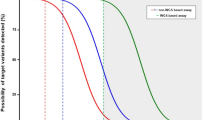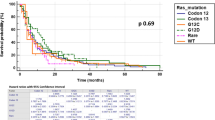Abstract
Purpose
This work was initiated to extend data on the effect of pharmacogenetics and chemotherapy pharmacokinetics (PK) on clinical outcome in patients with gastrointestinal malignancies.
Methods
We assessed 44 gene polymorphisms in 16 genes (TYMS, MTHFR, GSTP1, GSTM1, GSTT1, DPYD, XRCC1, XRCC3, XPD, ERCC1, RECQ1, RAD54L, ABCB1, ABCC2, ABCG2 and UGT2B7) in 64 patients with metastatic colorectal cancer (CRC) receiving capecitabine/oxaliplatin and 76 patients with advanced gastroesophageal cancer (GEC) receiving epirubicin/cisplatin/capecitabine, respectively. Plasma concentrations of anticancer drugs were measured for up to 24 h, and results were submitted to population PK analysis. We calculated the association between gene polymorphisms, chemotherapy exposure, tumor response, progression-free survival (PFS), overall survival (OS) and chemotherapy-related toxicity using appropriate statistical tests.
Results
Patients with a low clearance of 5FU were at increased risk of neutropenia (P < 0.05) and hand–foot syndrome (P = 0.002). DPYD T85C, T1896C and A2846T mutant variants were associated with diarrhea (P < 0.05) and HFS (P < 0.02), and IVS14+1G>A additionally with diarrhea (P < 0.001). The TYMS 2R/3G, 3C/3G or 3G/3G promoter variants were associated with worse PFS in the CRC (HR = 2.0, P < 0.01) and GEC group (HR = 5.4, P < 0.001) and worse OS in the GEC group (HR = 4.7, P < 0.001). The GSTP1 A313G mutant variant was associated with a higher PFS (HR = 0.55, P = 0.001) and OS (HR = 0.60, P = 0.002) in the CRC group.
Conclusions
Germline polymorphisms of DPYD, TYMS and GSTP1 have a significant effect on toxicity and clinical outcome in patients receiving capecitabine-based chemotherapy for advanced colorectal or gastroesophageal cancer. These data should further be validated in prospective clinical studies.


Similar content being viewed by others
References
Siegel R, Ma J, Zou Z, Jemal A (2014) Cancer statistics, 2014. CA Cancer J Clinic 64(1):9–29. doi:10.3322/caac.21208
Diaz-Rubio E, Tabernero J, Gomez-Espana A, Massuti B, Sastre J, Chaves M, Abad A, Carrato A, Queralt B, Reina JJ, Maurel J, Gonzalez-Flores E, Aparicio J, Rivera F, Losa F, Aranda E, Spanish Cooperative Group for the Treatment of Digestive Tumors T (2007) Phase III study of capecitabine plus oxaliplatin compared with continuous-infusion fluorouracil plus oxaliplatin as first-line therapy in metastatic colorectal cancer: final report of the Spanish Cooperative Group for the Treatment of Digestive Tumors Trial. J Clin Oncol Off J Am Soc Clin Oncol 25 (27):4224–4230. doi:10.1200/JCO.2006.09.8467
Skof E, Rebersek M, Hlebanja Z, Ocvirk J (2009) Capecitabine plus Irinotecan (XELIRI regimen) compared to 5-FU/LV plus Irinotecan (FOLFIRI regimen) as neoadjuvant treatment for patients with unresectable liver-only metastases of metastatic colorectal cancer: a randomised prospective phase II trial. BMC Cancer 9:120. doi:10.1186/1471-2407-9-120
Cunningham D, Starling N, Rao S, Iveson T, Nicolson M, Coxon F, Middleton G, Daniel F, Oates J, Norman AR, Upper Gastrointestinal Clinical Studies Group of the National Cancer Research Institute of the United K (2008) Capecitabine and oxaliplatin for advanced esophagogastric cancer. N Engl J Med 358(1):36–46. doi:10.1056/NEJMoa073149
Hitz F, Klingbiel D, Omlin A, Riniker S, Zerz A, Cerny T (2012) Athrombogenic coating of long-term venous catheter for cancer patients: a prospective, randomised, double-blind trial. Ann Hematol 91(4):613–620. doi:10.1007/s00277-011-1343-8
Ruzzo A, Graziano F, Loupakis F, Rulli E, Canestrari E, Santini D, Catalano V, Ficarelli R, Maltese P, Bisonni R, Masi G, Schiavon G, Giordani P, Giustini L, Falcone A, Tonini G, Silva R, Mattioli R, Floriani I, Magnani M (2007) Pharmacogenetic profiling in patients with advanced colorectal cancer treated with first-line FOLFOX-4 chemotherapy. J Clin Oncol Off J Am Soc Clin Oncol 25(10):1247–1254. doi:10.1200/JCO.2006.08.1844
Ruzzo A, Graziano F, Kawakami K, Watanabe G, Santini D, Catalano V, Bisonni R, Canestrari E, Ficarelli R, Menichetti ET, Mari D, Testa E, Silva R, Vincenzi B, Giordani P, Cascinu S, Giustini L, Tonini G, Magnani M (2006) Pharmacogenetic profiling and clinical outcome of patients with advanced gastric cancer treated with palliative chemotherapy. J Clin Oncol Off J Am Soc Clin Oncol 24(12):1883–1891. doi:10.1200/JCO.2005.04.8322
Cui YH, Liu TS, Zhuang RY, Gao HJ, Li H (2009) Polymorphism of thymidylate synthase gene and chemosensitivity of 5-fluorouracil regimen in metastatic gastrointestinal cancer. J Dig Dis 10(2):118–123. doi:10.1111/j.1751-2980.2009.00373.x
Arrazubi V, Suarez J, Guerrero D, Gomez M, Viudez A, Arias F, Balen E, Vera R (2013) Prognostic significance of thymidylate synthase polymorphisms in rectal cancer patients treated with neoadjuvant chemoradiotherapy. Colorect Dis Off J Assoc Coloproctol GB Irel 15(4):428–435. doi:10.1111/codi.12009
Castillo-Fernandez O, Santibanez M, Bauza A, Calderillo G, Castro C, Herrera R, Serrano A, Arrieta O, Herrera LA (2010) Methylenetetrahydrofolate reductase polymorphism (677 C>T) predicts long time to progression in metastatic colon cancer treated with 5-fluorouracil and folinic acid. Arch Med Res 41(6):430–435. doi:10.1016/j.arcmed.2010.08.011
Deenen MJ, Tol J, Burylo AM, Doodeman VD, de Boer A, Vincent A, Guchelaar HJ, Smits PH, Beijnen JH, Punt CJ, Schellens JH, Cats A (2011) Relationship between single nucleotide polymorphisms and haplotypes in DPYD and toxicity and efficacy of capecitabine in advanced colorectal cancer. Clin Cancer Res Off J Am Assoc Cancer Res 17(10):3455–3468. doi:10.1158/1078-0432.CCR-10-2209
Saif MW (2013) Dihydropyrimidine dehydrogenase gene (DPYD) polymorphism among Caucasian and non-Caucasian patients with 5-FU- and capecitabine-related toxicity using full sequencing of DPYD. Cancer Genom Proteomics 10(2):89–92
Loganayagam A, Arenas Hernandez M, Corrigan A, Fairbanks L, Lewis CM, Harper P, Maisey N, Ross P, Sanderson JD, Marinaki AM (2013) Pharmacogenetic variants in the DPYD, TYMS, CDA and MTHFR genes are clinically significant predictors of fluoropyrimidine toxicity. Br J Cancer 108(12):2505–2515. doi:10.1038/bjc.2013.262
Froehlich TK, Amstutz U, Aebi S, Joerger M, Largiader CR (2015) Clinical importance of risk variants in the dihydropyrimidine dehydrogenase gene for the prediction of early-onset fluoropyrimidine toxicity. Int J Cancer J Int du Cancer 136(3):730–739. doi:10.1002/ijc.29025
Li Q, Liu Y, Zhang HM, Huang YP, Wang TY, Li DS, Sun HZ (2014) Influence of DPYD genetic polymorphisms on 5-fluorouracil toxicities in patients with colorectal cancer: a meta-analysis. Gastroenterol Res Pract 2014:827989. doi:10.1155/2014/827989
Huang D, Zhou Y (2014) Nucleotide excision repair gene polymorphisms and prognosis of non-small cell lung cancer patients receiving platinum-based chemotherapy: a meta-analysis based on 44 studies. Biomed Rep 2(4):452–462. doi:10.3892/br.2014.282
Qin Q, Zhang C, Yang X, Zhu H, Yang B, Cai J, Cheng H, Ma J, Lu J, Zhan L, Liu J, Liu Z, Xu L, Sun X (2013) Polymorphisms in XPD gene could predict clinical outcome of platinum-based chemotherapy for non-small cell lung cancer patients: a meta-analysis of 24 studies. PLoS ONE 8(11):e79864. doi:10.1371/journal.pone.0079864
Chen YC, Tzeng CH, Chen PM, Lin JK, Lin TC, Chen WS, Jiang JK, Wang HS, Wang WS (2010) Influence of GSTP1 I105 V polymorphism on cumulative neuropathy and outcome of FOLFOX-4 treatment in Asian patients with colorectal carcinoma. Cancer Sci 101(2):530–535. doi:10.1111/j.1349-7006.2009.01418.x
Lv H, Han T, Shi X, Yao Y, Yao Y, Qiu W, Yue L, Liang J (2014) Genetic polymorphism of GSTP1 and ERCC1 correlated with response to platinum-based chemotherapy in non-small cell lung cancer. Med Oncol 31(8):86. doi:10.1007/s12032-014-0086-5
Brouwers EE, Tibben MM, Joerger M, van Tellingen O, Rosing H, Schellens JH, Beijnen JH (2005) Determination of oxaliplatin in human plasma and plasma ultrafiltrate by graphite-furnace atomic-absorption spectrometry. Anal Bioanal Chem 382(7):1484–1490. doi:10.1007/s00216-005-3302-5
van Asperen J, van Tellingen O, Beijnen JH (1998) Determination of doxorubicin and metabolites in murine specimens by high-performance liquid chromatography. J Chromatogr B Biomed Sci Appl 712(1–2):129–143
Vainchtein LD, Rosing H, Schellens JH, Beijnen JH (2010) A new, validated HPLC-MS/MS method for the simultaneous determination of the anti-cancer agent capecitabine and its metabolites: 5′-deoxy-5-fluorocytidine, 5′-deoxy-5-fluorouridine, 5-fluorouracil and 5-fluorodihydrouracil, in human plasma. Biomed Chromatogr BMC 24(4):374–386. doi:10.1002/bmc.1302
Joerger M, Huitema AD, Koeberle D, Rosing H, Beijnen JH, Hitz F, Cerny T, Schellens JH, Gillessen S (2014) Safety and pharmacology of gemcitabine and capecitabine in patients with advanced pancreatico-biliary cancer and hepatic dysfunction. Cancer Chemother Pharmacol 73(1):113–124. doi:10.1007/s00280-013-2327-2
Guichard SM, Macpherson JS, Mayer I, Reid E, Muir M, Dodds M, Alexander S, Jodrell DI (2008) Gene expression predicts differential capecitabine metabolism, impacting on both pharmacokinetics and antitumour activity. Eur J Cancer 44(2):310–317. doi:10.1016/j.ejca.2007.10.023
Suenaga M, Fuse N, Yamaguchi T, Yamanaka Y, Motomura S, Matsumoto H, Hamamoto Y, Mizunuma N, Doi T, Hatake K, Iwasaki J, Ohtsu A (2014) Pharmacokinetics, safety, and efficacy of FOLFIRI plus bevacizumab in Japanese colorectal cancer patients with UGT1A1 gene polymorphisms. J Clin Pharmacol. doi:10.1002/jcph.246
Kawakami K, Omura K, Kanehira E, Watanabe Y (1999) Polymorphic tandem repeats in the thymidylate synthase gene is associated with its protein expression in human gastrointestinal cancers. Anticancer Res 19(4B):3249–3252
Kawakami K, Watanabe G (2003) Identification and functional analysis of single nucleotide polymorphism in the tandem repeat sequence of thymidylate synthase gene. Cancer Res 63(18):6004–6007
Park DJ, Stoehlmacher J, Zhang W, Tsao-Wei D, Groshen S, Lenz HJ (2002) Thymidylate synthase gene polymorphism predicts response to capecitabine in advanced colorectal cancer. Int J Colorectal Dis 17(1):46–49
Pullarkat ST, Stoehlmacher J, Ghaderi V, Xiong YP, Ingles SA, Sherrod A, Warren R, Tsao-Wei D, Groshen S, Lenz HJ (2001) Thymidylate synthase gene polymorphism determines response and toxicity of 5-FU chemotherapy. Pharmacogenomics J 1(1):65–70
Goekkurt E, Hoehn S, Wolschke C, Wittmer C, Stueber C, Hossfeld DK, Stoehlmacher J (2006) Polymorphisms of glutathione S-transferases (GST) and thymidylate synthase (TS)—novel predictors for response and survival in gastric cancer patients. Br J Cancer 94(2):281–286. doi:10.1038/sj.bjc.6602891
Kawakami K, Graziano F, Watanabe G, Ruzzo A, Santini D, Catalano V, Bisonni R, Arduini F, Bearzi I, Cascinu S, Muretto P, Perrone G, Rabitti C, Giustini L, Tonini G, Pizzagalli F, Magnani M (2005) Prognostic role of thymidylate synthase polymorphisms in gastric cancer patients treated with surgery and adjuvant chemotherapy. Clin Cancer Re Off J Am Assoc Cancer Res 11(10):3778–3783. doi:10.1158/1078-0432.CCR-04-2428
Ye F, Liu Z, Tan A, Liao M, Mo Z, Yang X (2013) XRCC1 and GSTP1 polymorphisms and prognosis of oxaliplatin-based chemotherapy in colorectal cancer: a meta-analysis. Cancer Chemother Pharmacol 71(3):733–740. doi:10.1007/s00280-012-2067-8
van Kuilenburg AB, Dobritzsch D, Meinsma R, Haasjes J, Waterham HR, Nowaczyk MJ, Maropoulos GD, Hein G, Kalhoff H, Kirk JM, Baaske H, Aukett A, Duley JA, Ward KP, Lindqvist Y, van Gennip AH (2002) Novel disease-causing mutations in the dihydropyrimidine dehydrogenase gene interpreted by analysis of the three-dimensional protein structure. Biochem J 364(Pt 1):157–163
Caudle KE, Thorn CF, Klein TE, Swen JJ, McLeod HL, Diasio RB, Schwab M (2013) Clinical Pharmacogenetics Implementation Consortium guidelines for dihydropyrimidine dehydrogenase genotype and fluoropyrimidine dosing. Clin Pharmacol Ther 94(6):640–645. doi:10.1038/clpt.2013.172
Henin E, You B, VanCutsem E, Hoff PM, Cassidy J, Twelves C, Zuideveld KP, Sirzen F, Dartois C, Freyer G, Tod M, Girard P (2009) A dynamic model of hand-and-foot syndrome in patients receiving capecitabine. Clin Pharmacol Ther 85(4):418–425. doi:10.1038/clpt.2008.220
Acknowledgments
This work was supported by a fellowship grant of the European Society of Medical Oncology Grant (ESMO), a research grant of the Union International Contre le Cancer Grant (UICC) and a Research Grant from the Swiss National Science Foundation (SNF) (PBBSB-102331).
Conflict of interest
No potential conflicts of interest were disclosed by the authors.
Author information
Authors and Affiliations
Corresponding author
Electronic supplementary material
Below is the link to the electronic supplementary material.
Rights and permissions
About this article
Cite this article
Joerger, M., Huitema, A.D.R., Boot, H. et al. Germline TYMS genotype is highly predictive in patients with metastatic gastrointestinal malignancies receiving capecitabine-based chemotherapy. Cancer Chemother Pharmacol 75, 763–772 (2015). https://doi.org/10.1007/s00280-015-2698-7
Received:
Accepted:
Published:
Issue Date:
DOI: https://doi.org/10.1007/s00280-015-2698-7




